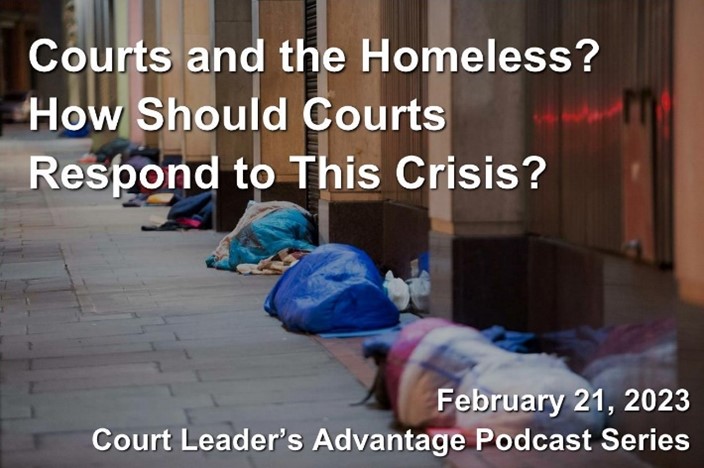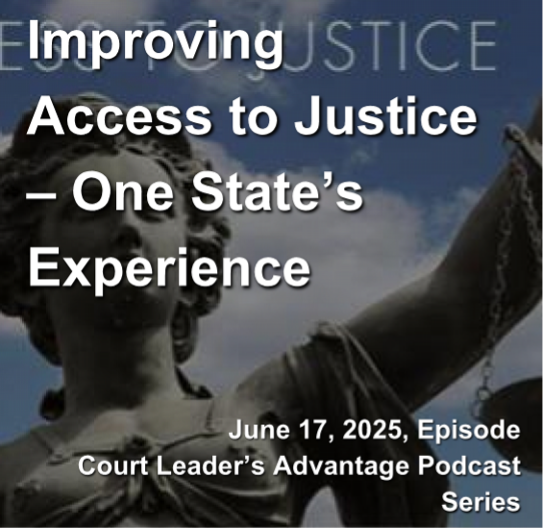February 21st, 2023, NACM Court Leader’s Advantage Podcast Episode
We see this growing crisis everywhere. We pass the cardboard sign at the intersection asking for donations and wishing us: “God Bless.” We see the blue tarp and shopping cart half hidden in that small grove of trees next to the freeway. We see him sleeping on the sidewalk over the grate.
Although we know the crisis is growing, we don’t even have a good idea of how big it is. The statistics are so vague they are better described as guesstimates. By one guestimate, there are over half a million homeless nationwide. Los Angeles for example is believed to have over 40,000 homeless.
Experts think that about a third of the homeless suffer from mental illness; a third have drug or alcohol issues. There is a crossover so a sizeable percentage suffers from both. In addition, other root causes of homelessness include being priced out of housing, being a victim of domestic violence, being unemployed, having a disability, having had a financial disaster such as a catastrophic illness, or just being poor and old.
This month we look at how courts respond to homelessness and how they should be addressing this growing crisis. Next to the police, the courts are one of the first points of contact with the homeless. A court may operate a homeless court. If not, the homeless are on landlord-tenant, criminal, mental health, and even family court dockets.
Our polarized society struggles with dramatically different perspectives on how to respond to homelessness. One perspective is that courts are in the best position to refer the homeless to get help including housing assistance, employment counseling, food and clothing banks, public health clinics, mental health, and drug counseling, as well as access to justice.
A countervailing perspective is that courts are not social service agencies. If a homeless person is before the court, he or she is there because of a legal action: a crime, an eviction, or a probate mental health issue. Courts should “stay in their lane” and just deal with the litigant’s legal matters.
Today’s Panelists
• The Honorable Mary Logan, Judge with the Municipal Court in Spokane, Washington
• The Honorable Alicia Skupin, Chief Magistrate with the Municipal Court in Chandler, Arizona, and
• Barbara Marcille, Trial Court Administrator for the Multnomah County Circuit Court in Portland, Oregon
Click here to listen to the podcast. The audio version is 39 minutes 15 seconds and the video version is 41 minutes 31 seconds.
Leave a question or comment about the episode at clapodcast@nacmnet.org.
Show Notes
Additional Resources
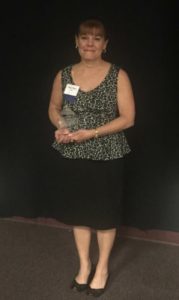
The Honorable Mary Logan
Judge Mary Logan has been practicing law for over 27 years as a licensed attorney in California and in Washington. As a Judge, she was elected Presiding Judge of the Spokane Municipal Court from 2009 through 2014. Among Logan’s many accomplishments, she is one of the “core engineers” of the City of Spokane’s Community Court and presides over the City’s Veteran’s Therapeutic Court. She has also been involved in the nationally recognized Street Law Program as an instructor at a local high school.
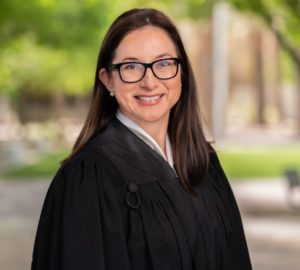
The Honorable Alicia M. Skupin
Alicia M. Skupin is the Presiding Magistrate for the Chandler Municipal Court. She was appointed in 2021 after serving as an associate judge for 7 years. She is a member of the Commission on Diversity, Equality, and Justice in the Judiciary; faculty member for the annual Limited Jurisdiction New Judge Orientation program; an editor for the Limited Jurisdiction Bench Book and was recently appointed to the Commission on Technology. She also served on the AZ State Bar’s Criminal Jury Instructions Committee from 2006-2013. Prior to joining the bench in Chandler, Judge Skupin was as a hearing officer for the Scottsdale City Court. While in private practice, Judge Skupin volunteered with Los Abogados and served on its executive board for six years. She received her Juris Doctorate from ASU in 2001. Judge Skupin resides in Chandler and enjoys spending time with her husband and four children.
 Barbara Marcille
Barbara Marcille
Barbara Marcille is the Trial Court Administrator for the Circuit Court in the Portland, Oregon metropolitan area, and manages approximately 330 employees across five court facilities with 58 courtrooms. She has served in a variety of roles for the courts in Oregon, New Mexico, and North Carolina, and holds a degree in Business from Florida State University. Prior to working with the court system she was Client Services Manager for a high-tech advertising agency in the Silicon Valley, and has combined that communications background with her commitment to public service to help the court improve access to justice. For the last six years she has collaborated on the design and construction of a new 17-story courthouse on the Portland waterfront, and successfully completed the opening of that new courthouse in the midst of the 2020 pandemic.

Zenell Brown
As a Court Administrator, Zenell Brown has garnered respect for her ethical leadership and innovation. She has built her approach on three pillars: communication, leadership responsibility and accountability, and diversity and inclusion. She has shared her “Justice for All” leadership and organizational wisdom at local, state, and national level conferences for court managers and teams.
Zenell continues to add to her current credentials of Juris Doctor (Wayne State University Law School), Public Service Administration Graduate Certificate (Central Michigan University), Court Administration Certificate (Michigan State University), and Certified Diversity Professional (National Diversity Council-Diversity First).

T.J. BeMent
Tracy “T.J.” BeMent is the District Court Administrator for the 10th Judicial Administrative District of Georgia. The 10th JAD covers the general jurisdiction superior courts in six circuits in 21 counties. He was previously the Court Administrator for the Athens-Clarke County Courts in Athens, Georgia, where he worked with all six levels of trial courts in the county. He acts as the primary liaison to the state and county governments and serves as a resource for the judges and judicial staff on many issues. Mr. BeMent administers nearly $2 million in state and federal grants and is a federal grant peer reviewer. He has been working in the courts for more than 15 years. Prior to coming to Georgia, he was the Assistant Court Administrator for the Las Vegas Justice Court and previously the Clerk of Court and Chief Administrative Officer of the District of Columbia’s Office of Administrative Hearings. He received his undergraduate and graduate degrees from the George Washington University in Washington, DC, and completed his ICM Fellowship in spring 2015.
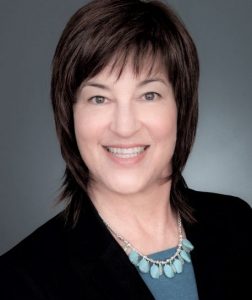
Liz Rambo
Liz Rambo is the Trial Court Administrator for Lane County Circuit Court. As the TCA for one of Oregon’s largest courts, Liz is responsible for all non-judicial court functions including budget, human resources, technology, facilities, and business efficiency. A 31-year court employee, Liz has a history of advocacy for the mission of the Oregon Judicial Department and the service that the Oregon Judicial Branch provides to the public. Liz has served on a variety of judicial branch leadership committees including as Chair of the Chief Justice Communications Committee, member of the Chief Justice Strategic Planning Committee, Law and Policy Workgroup, Internal Audit Committee, the Oregon eCourt Steering Committee.
For the last five years, Liz has worked closely with Lane County leadership toward building a new Lane County Courthouse and will continue to bring her years of experience to that ongoing project through design and construction. Liz graduated with high scholarship from Oregon State University with a BA in history and has an MBA from Portland State University. She is a long-time member of the National Association of Court Management and holds a Court Manager certification from the National Center for State Courts.

Stacey L. Fields
Stacey L. Fields is the Court Administrator for the City of Crestwood and has worked in the judiciary for 12 years. She has been a member of NACM for 5 years and serves on the Conference Development Committee. She also serves as Vice President of the Metropolitan St. Louis Association for Court Administration (MSLACA) and on the board of the Missouri Association for Court Administration as Professional Development Director.

